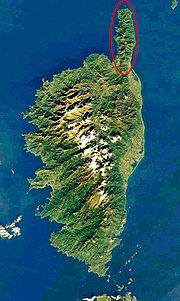
Cap Corse
Encyclopedia

Corsica
Corsica is an island in the Mediterranean Sea. It is located west of Italy, southeast of the French mainland, and north of the island of Sardinia....
(Corse in French), is a 25-mile (40 km) long peninsula
Peninsula
A peninsula is a piece of land that is bordered by water on three sides but connected to mainland. In many Germanic and Celtic languages and also in Baltic, Slavic and Hungarian, peninsulas are called "half-islands"....
located at the northern tip of the island. At the base of it is the second largest city in Corsica, Bastia
Bastia
Bastia is a commune in the Haute-Corse department of France located in the northeast of the island of Corsica at the base of Cap Corse. It is also the second-largest city in Corsica after Ajaccio and the capital of the department....
. Cap Corse is also a Communauté de communes
Communauté de communes
A communauté de communes is a federation of municipalities in France. It forms a framework within which local tasks are carried out together...
comprising 18 communes.
History
Numerous historians have termed Cap Corse "the Sacred Promontory" and have gone so far as to suppose the name came from a high concentration of early Christian settlements. This is a folk-etymology.The term comes from the geographer Ptolemy
Ptolemy
Claudius Ptolemy , was a Roman citizen of Egypt who wrote in Greek. He was a mathematician, astronomer, geographer, astrologer, and poet of a single epigram in the Greek Anthology. He lived in Egypt under Roman rule, and is believed to have been born in the town of Ptolemais Hermiou in the...
, who called his first and northernmost location on Corisca the hieron achron in ancient Greek
Ancient Greek
Ancient Greek is the stage of the Greek language in the periods spanning the times c. 9th–6th centuries BC, , c. 5th–4th centuries BC , and the c. 3rd century BC – 6th century AD of ancient Greece and the ancient world; being predated in the 2nd millennium BC by Mycenaean Greek...
, transliterated by the Romans to sacrum promontorium. This is not the only point of land to be so-called; there were many others in the classical world, none of them Christian. The meaning is somewhat ambiguous, whether it was called that because of a temple placed there or whether as the end of the land it was sacred to the god of the sea. If the date of the Geography is taken arbitrarily to be 100 AD, and Ptolemy was working from earlier sources, a Christian association is highly unlikely. There is no evidence that Corsica was converted earlier than the 6th century AD, no evidence of any Christian communities in the area in Ptolemy's time, and the concentration of later Christian edifices is no greater than they are in any populated region of Corsica.
Ptolemy's interpretation of promontory also is not clear. It has been taken to mean the entire Cap Corse, the Pointe du Cap Corse, or some one of the small promontories on it. Sometimes it is associated with Macinaggio, but the problem remains unsolved.
There is some geographic justification for associating Ptolemy's entire tribe, the Vanacini, which are described as "more to the north", with Cap Corse, as it is a distinct geophysical environment. The Vanacini appear in a bronze tablet found in northern Corsica repeating a letter from the emperor Vespasian
Vespasian
Vespasian , was Roman Emperor from 69 AD to 79 AD. Vespasian was the founder of the Flavian dynasty, which ruled the Empire for a quarter century. Vespasian was descended from a family of equestrians, who rose into the senatorial rank under the Emperors of the Julio-Claudian dynasty...
to "the magistrates and senators of the Vanacini" written about 72 AD, in Ptolemy's time. The Vanacini had bought some land from Colonia Mariana, a Roman colony in the vicinity of Bastia
Bastia
Bastia is a commune in the Haute-Corse department of France located in the northeast of the island of Corsica at the base of Cap Corse. It is also the second-largest city in Corsica after Ajaccio and the capital of the department....
, and complained about the borders fixed by the procurator
Procurator (Roman)
A procurator was the title of various officials of the Roman Empire, posts mostly filled by equites . A procurator Augusti was the governor of the smaller imperial provinces...
from whom they had bought it. The emperor on receiving the complaint appointed another procurator to arbitrate and wrote informing the complainants. The inscription is documentary evidence of the historicity of the Vanacini.

